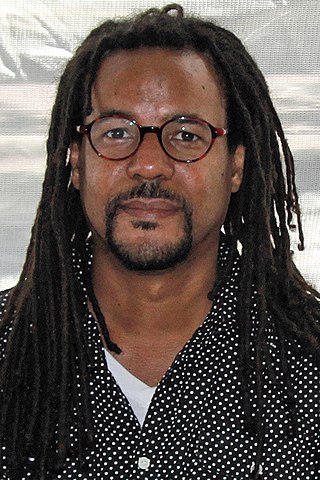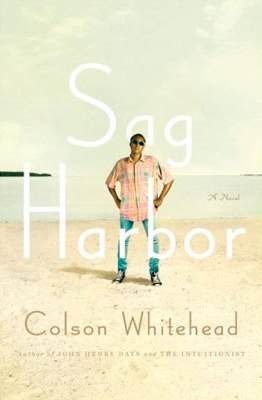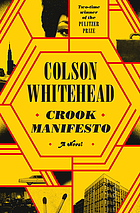
The Pulitzer Prize for Fiction is one of the seven American Pulitzer Prizes that are annually awarded for Letters, Drama, and Music. It recognizes distinguished fiction by an American author, preferably dealing with American life, published during the preceding calendar year.

Richard Ford is an American novelist and short story author, and writer of a series of novels featuring the character Frank Bascombe.

Arch Colson Chipp Whitehead is an American novelist. He is the author of nine novels, including his 1999 debut The Intuitionist; The Underground Railroad (2016), for which he won the 2016 National Book Award for Fiction and the 2017 Pulitzer Prize for Fiction; and The Nickel Boys, for which he won the Pulitzer Prize for Fiction again in 2020, making him one of only four writers ever to win the prize twice. He has also published two books of nonfiction. In 2002, he received a MacArthur Fellowship.

Nick Mamatas is an American horror, science fiction and fantasy author and editor for Haikasoru's line of translated Japanese science fiction novels for Viz Media. His fiction has been nominated for a number of awards, including several Bram Stoker Awards. He has also been recognised for his editorial work with a Bram Stoker Award, as well as World Fantasy Award and Hugo Award nominations. He funded his early writing career by producing term papers for college students, which gained him some notoriety when he described this experience in an essay for Drexel University's online magazine The Smart Set.

Benjamin S. Lerner is an American poet, novelist, essayist, and critic. The recipient of fellowships from the Fulbright, Guggenheim, and MacArthur Foundations, Lerner has been a finalist for the National Book Award for Poetry, the National Book Critics Circle Award in fiction, and the Pulitzer Prize for Fiction, among many other honors. Lerner teaches at Brooklyn College, where he was named a Distinguished Professor of English in 2016.

Jim Butcher is an American author. He has written the contemporary fantasy The Dresden Files, Codex Alera, and Cinder Spires book series.

John Henry Days is a 2001 novel by American author Colson Whitehead. This is his second full-length work.

The Echo Maker is a 2006 novel by American writer Richard Powers. It won the National Book Award for Fiction and was a Pulitzer Prize for Fiction finalist.
Richard Melo is an American author and book reviewer. He is the author of the novels Happy Talk and Jokerman 8.

Tui Tamara Sutherland is an American children's book author who has written more than 60 books under her own name and under several pen names. In 2009, she won $46,200 over three games on Jeopardy! She is best known for writing the Wings of Fire series of epic dragon fantasy novels. Sutherland's books have sold over 15 million copies.

Mary Robinette Kowal is an American author, translator, art director, and puppeteer. She has worked on puppetry for shows including Jim Henson Productions and the children's show LazyTown. As an author, she is a four-time Hugo Award winner, and served as the president of the Science Fiction and Fantasy Writers of America from 2019-2021.

Sag Harbor is a 2009 novel by author Colson Whitehead.

Zone One is a 2011 novel by American author Colson Whitehead. Blending elements of genre fiction and literary fiction, the novel takes place in a post-apocalyptic United States ravaged by zombies. Whitehead has stated that the novel was partly an attempt to return to his adolescent fascination with horror writer Stephen King and science fiction icon Isaac Asimov.

Lincoln in the Bardo is a 2017 experimental novel by American writer George Saunders. It is Saunders's first full-length novel and was The New York Times hardcover fiction bestseller for the week of March 5, 2017.

The Underground Railroad is a historical fiction novel by American author Colson Whitehead, published by Doubleday in 2016. The alternate history novel tells the story of Cora, a slave in the Antebellum South during the 19th century, who makes a bid for freedom from her Georgia plantation by following the Underground Railroad, which the novel depicts as an actual rail transport system with safe houses and secret routes. The book was a critical and commercial success, hitting the bestseller lists and winning several literary awards, including the Pulitzer Prize for Fiction, the National Book Award for Fiction, the Arthur C. Clarke Award, and the 2017 Andrew Carnegie Medal for Excellence. A TV miniseries adaptation, written and directed by Barry Jenkins, was released in May 2021.

The Nickel Boys is a 2019 novel by American novelist Colson Whitehead. It is based on the historic Dozier School, a reform school in Florida that operated for 111 years and was revealed as highly abusive. A university investigation found numerous unmarked graves for unrecorded deaths and a history into the late 20th century of emotional and physical abuse of students.

The Water Dancer is the debut novel by Ta-Nehisi Coates, published on September 24, 2019, by Random House under its One World imprint. It is a surrealist story set in the pre-Civil War South, concerning a superhuman protagonist named Hiram Walker who possesses a photographic memory, but who cannot remember his mother. He learns he has a special ability known as "conduction", with which he is able to transport people—including himself—over long distances. Conduction is powered by his memories and storytelling, and can fold the Earth like fabric, allowing travel across large areas via waterways.

Harlem Shuffle is a 2021 novel by American novelist Colson Whitehead. It is the follow-up to Whitehead's 2019 novel The Nickel Boys, which earned him his second Pulitzer Prize for Fiction. It is a work of crime fiction and a family saga that takes place in Harlem between 1959 and 1964. It was published by Doubleday on September 14, 2021.
The Los Angeles Times Book Prize for Graphic Novel/Comics, established in 2009, is a category of the Los Angeles Times Book Prize. Works are eligible during the year of their first US publication in English, though they may be written originally in languages other than English.

Crook Manifesto is a 2023 novel by Colson Whitehead, published by Doubleday. It returns to the fictional world of his previous book, Harlem Shuffle. It is a work of crime fiction and a family saga that takes place in Harlem during three periods: 1971, 1973, and 1976, the year of the United States Bicentennial celebration.


















